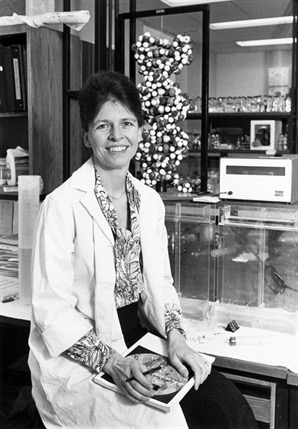Yale professor Joan Steitz wins Wolf Prize in medicine
As a prominent researcher and mentor in the Yale community, Steitz has dedicated her life to science, overcoming barriers and setting a precedent for young people in science.

Courtesy of Joan Steitz
On Feb. 9, the Wolf Prize in medicine was awarded to three scientists whose research in mRNA enabled the development of COVID-19 vaccines: Lynne Maquat, Adrian Krainer and Yale professor Joan Steitz.
A Sterling Professor of Molecular Biophysics and Biochemistry, Steitz has forged a career as a pioneer in RNA research, making discoveries that now form the foundation of scientists’ knowledge of genetics. The Wolf Prize in medicine has been awarded once a year since 1978 by the Wolf Foundation in Israel, and recipients are chosen “for achievements in the interest of mankind” and receive a monetary prize of $100,000, according to the Wolf Foundation website.
“I would certainly place Joan among the very top scientific-thought leaders that I’ve come across in my lifetime,” Chair of Molecular Biophysics and Biochemistry and Branford Head of College Enrique De La Cruz said. “She is truly a testament to the great science that can happen at Yale, where young scientists can grow to become leaders in their fields. Above all, her great career exemplifies what can actually be accomplished when the University invests in its faculty.”
Steitz’s interest in science began at a young age, but she said that growing up during the mid-20th century left her with few female role models in molecular biology.
Nevertheless, Steitz continued to pursue her passion for science, receiving a bachelor’s degree in chemistry from Antioch College. During her undergraduate career, she spent time working in the laboratory of Alex Rich at the Massachusetts Institute of Technology as part of her college’s work-study program. It was there that she first became interested in molecular biology and genetics.
“This was just at the dawn of the era of molecular biology, and discoveries about DNA and genes at the molecular level were so new that they weren’t in any textbook or courses I took,” Steitz said. “But when I got to Alex Rich’s lab and heard about the recently-discovered double stranded DNA, I was completely amazed. It was my time there that fostered my lifelong passion for RNA.”
After graduating from Antioch College, Steitz was set to attend Harvard Medical School. However, after working in the lab of Joe Gall — a cell biologist who would later join the Department of Molecular, Cellular and Developmental Biology at Yale — at the University of Minnesota the summer after graduation, she decided instead to pursue her passion for research. She ended up completing Harvard’s doctorate program in biochemistry and molecular biology.
As she followed this path, she came in contact with many prominent figures in biology, such as the co-discoverer of the DNA double helix and Nobel Laureate James Watson, whose lab she joined as its first female graduate student. As a postdoctoral fellow at the University of Cambridge, she discovered the location where ribosomes bind to mRNA to start protein synthesis — an “absolutely mindblowing” discovery, according to Steitz.
In 1970, just one year after Yale began accepting female undergraduate students, Steitz joined the Yale faculty as an assistant professor in the Department of Molecular Biophysics and Biochemistry. Since then, she has continued her research in RNA biology, in addition to serving the community as a professor and mentor.
“Many graduate students, postdoctoral fellows and junior faculty came to Yale because of her work and the excitement it generated,” Director of the Yale Center for RNA Science and Medicine Karla Neugebauer wrote in an email to the News. “She is a very generous mentor of scientists at all career stages.”
In 2018, Steitz spoke at a college tea at Branford, which attracted dozens of students and faculty members. De La Cruz remembers the tea as a truly memorable event for many Yale students, who were inspired by Steitz’s approachable nature, sincerity and passion for science and teaching.
When asked about the Wolf Prize, Steitz first recognized the incredible work of her colleagues with whom she shares the award.
“I’m really pleased to be sharing it with two other people from the RNA field,” Steitz said. “I’ve known them for a long time and really respect their work. I think it’s incredible that the prize honors all the background work that was done by people in the RNA field that have now made the mRNA vaccines possible.”
Steitz also emphasized the importance of carrying out fundamental scientific research that can have profound impacts on human health in the future. For example, the work done by Steitz and her colleagues laid the foundation for some of the methods scientists used to find therapeutics and vaccines for COVID-19.
When asked about the award’s significance, Steitz pointed to the importance of female scientists gaining recognition for their work.
“I firmly believe that women have been underrepresented in terms of receiving awards,” Steitz said. “I know that when I receive one, at least a young girl interested in science can look at me and feel inspired to pursue her passions.”
Steitz has been a faculty member in the Department of Biophysics and Biochemistry at the University for 50 years.
Veronica Lee | veronica.lee@yale.edu







